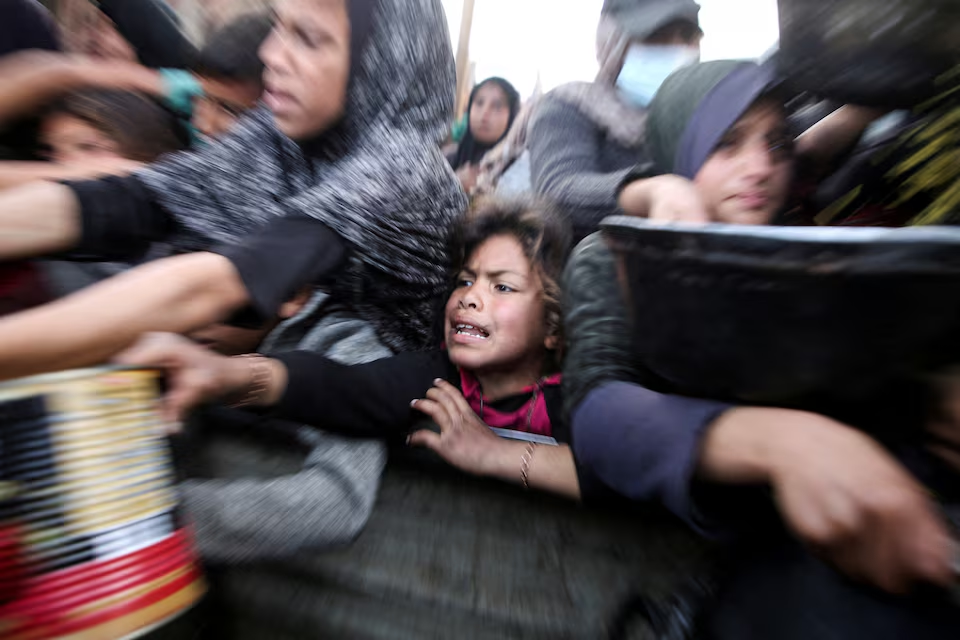
Summary
- LATEST DEVELOPMENTS
- Ceasefire takes effect at 0630 GMT on Sunday, Qatar says
- Full cabinet ratification follows lengthy meeting
- Security cabinet has also given its approval
- Israel carries out new airstrikes in Gaza on Saturday
Israel’s cabinet approved a deal with Palestinian militant group Hamas for a ceasefire and release of hostages in the Gaza Strip, Prime Minister Benjamin Netanyahu’s office said on Saturday, a day before the agreement’s scheduled start.
In the early hours of Saturday, after meeting for more than six hours, the government ratified the agreement that could pave the way for an end to the 15-month-old war in the Palestinian enclave, which Hamas controls.
“The Government has approved the framework for the return of the hostages. The framework for the hostages’ release will come into effect on Sunday,” Netanyahu’s office said in a brief statement.
In Gaza, Israeli warplanes have kept up heavy attacks since the ceasefire deal was agreed.
Israeli tanks shelled eastern areas of the Zeitoun neighbourhood of Gaza City and Israeli planes fired on areas in central and southern Gaza on Saturday, residents said. Medics in Gaza said five people were killed in a tent in the Mawasi area west of Khan Younis during an airstrike on the enclave’s south.
Some 123 Palestinians have now been killed by Israeli bombardments since the accord was announced on Wednesday, the Palestinian Civil Emergency Service said.
Sirens sounded in Jerusalem and Tel Aviv on Saturday. The military later said it has shot down a missile fired from Yemen and there was no mention of any casualties.
After the Israeli cabinet approval, lead U.S. negotiator Brett McGurk said the plan was moving forward on track.
The ceasefire will come into effect at 0630 GMT on Sunday, the Qatari foreign ministry spokesman posted on X. The White House expects three female hostages to be released to Israel in the afternoon through the Red Cross.
“We have locked down every single detail in this agreement. We are quite confident… it is ready to be implemented on Sunday,” McGurk told CNN from the White House.
Under the deal, the three-stage ceasefire starts with an initial six-week phase when hostages held by Hamas will be exchanged for prisoners and detainees jailed in Israel.
Thirty-three of the 98 remaining Israeli hostages, including women, children, men over 50 and ill and wounded captives, are to be freed in this phase. In return, Israel will release almost 2,000 Palestinians from its jails.
They include 737 male, female and teen-aged prisoners, some of whom are members of Palestinian militant groups convicted of attacks that killed dozens of Israelis, as well as hundreds of Palestinians from Gaza in detention since the start of the war.
The Israeli Justice Ministry published their details early on Saturday, along with the ceasefire agreement, which said 30 Palestinian prisoners would be released for each female hostage on Sunday.
The Israeli military said it was preparing to receive the hostages “in accordance with the set agreements” and that the military “is operating to provide suitable physical and psychological support, with careful attention to every detail.”
After Sunday’s hostage release, McGurk said, the accord calls for four more female hostages to be released after seven days, followed by the release of three further hostages every seven days thereafter.
HARD-LINERS OPPOSE CEASEFIRE
With the accord opposed by some Israeli cabinet hard-liners, media reports said 24 ministers in Netanyahu’s coalition government voted in favour of the deal while eight opposed it.
The opponents said the ceasefire agreement represented a capitulation to Hamas. National Security Minister Itamar Ben-Gvir threatened to resign if it was approved and urged other ministers to vote against it. However, he said he would not bring down the government.
Finance Minister Bezalel Smotrich, also threatened to quit the government if it does not go back to war to defeat Hamas after the first six-week phase of the ceasefire.
After a last-minute delay on Thursday that Israel blamed on Hamas, the Israeli security cabinet voted on Friday in favour of the ceasefire accord, a requirement before the full cabinet vote.
Israel began its assault on Hamas in Gaza after the group’s fighters burst into Israel on Oct. 7, 2023, killing some 1,200 people and taking 250 were taken hostage, according to Israeli tallies.
The war between Israeli forces and Hamas has razed much of heavily urbanised Gaza, killed more than 46,000 people and displaced most of the enclave’s prewar population of 2.3 million several times, according to Gaza authorities.
If successful, the ceasefire could ease hostilities elsewhere in the Middle East, where fighting has spread to include Iran and its proxies – Lebanon’s Hezbollah, Yemen’s Houthis and armed groups in Iraq – and the occupied West Bank.
Gaza civilians have faced a humanitarian crisis due to hunger, cold and sickness. The ceasefire agreement calls for a surge in assistance, and international organisations have aid trucks lined up on Gaza’s borders.
Palestinian relief agency UNRWA said on Friday that it has 4,000 truckloads of aid, half of which are food, ready to enter.